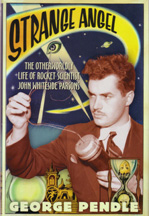|
Home
|
How To Make Rockets, Meet Chicks And Invoke Your Holy Guardian Angel A review of "Strange Angel" A review of "Strange Angel" by George Pendle (Hardcort, Inc. 2005) Nature or nurture? That is the central question author George Pendle seeks to answer. In pursuit of this quest, Pendle devotes much space to the environmental and social stimulus, and intellectual climate, that affected Jack in his formative years. Several factors vie for the honor of explaining how a young Californian of the thirties and forties became an expert in the then burgeoning field of rocket science, made history designing solid-fuel rocket propellants, and yet was a pre-hippie hedonist who espoused "free love" and arcane occult theories and engaged in rituals of evocatory magic as a pastime. This is the central enigma: Parsons as a pioneer in both rocket science and mysticism. How could such a thing be? How could one psyche equally embrace science and occultism? John Whiteside (Jack) Parsons was born with a couple of silver spoons in his mouth. Both his maternal and paternal grandparents were well off. Needing a change of pace after losing one baby, Jack's parents relocated from the mid-west to California where he was born. However, after his father's martial indiscretions came to light, and while Jack was still a toddler, he became a child of divorce. He and his father were never reconciled. Jack and his mother were soon joined in California by his maternal grandparents, who moved them to a mansion in fashionable Pasadena. Jackss grandfather was his the first of his surrogate fathers. Alas, neither the mansion nor the grandfather lasted long and Jack, a slightly overweight bookish-child, was left to his own devices. And his primary interest was a new field of literature called science fiction. It was from the seminal works of science fiction, and through intercourse with itss devotees, that he came to his interest in rockets. That interest led to experiments with his friends and eventually to a position in a research group, sponsored by Cal Tech University, that was dedicated to studying rocket propulsion. The other significant event in his young adulthood was his introduction to occultism in the form of the OTO (Order of the Eastern Temple). The OTO was a reanimated form of Western Magic, and it's chief espouser, and the ultimate force behind the magical revival, was the infamous Englishman, Aleister Crowley. Jack quickly became fascinated with Crowley, and the order's local leader, a new father figure, and threw himself into the study of mysticism with the same dedication he had the study of rocket propellants. He came to view evocatory magic as akin to scientific process, i.e., a careful way of reproducing specific effects by rote procedure. While Crowley - the self-proclaimed anti-Christ, who is seen primarily by the correspondence he exchanges with Parsons and other members of the OTO--comes through as a bit of an opportunist, perhaps even an evilly-genial con man, he is not the villain of the piece. That honor is reserved for a more familiar name: L. Ron Hubbard, of "Scientology" fame. Strange Angel paints an unflattering picture of this science fiction writer and New Age religious proselyte, picturing him as a con-man and nave who steals Jacks love interest (the young and nubile half-sister of Jack's wife) as well as his fortune. By even the kindest reading, Hubbard comes across as an amoral opportunist of the first rank. But perhaps Hubbard couldn't resist: throughout the book Parsons, for all his independence, is presented as possessing a malleable personality--sincere, but somewhat gullible, perhaps naive. By the time Jack accidentally blows himself up with fulminate of Mercury it all seems inevitable. Naturally, since Jack was associated with magic, and alchemy, the legend was created almost before the smoke cleared: Jack was working on some secret alchemical process to contact his Holy Guardian Angel and paid the price. Actually, it was something almost shamefully mundane: he was working to produce some effects for a Hollywood production company. His mother, on hearing of her only child's death, immediately took an overdose of sleeping pills. She joined him within the hour. |
 On a quiet afternoon in June of 1952, handsome young rocket scientist Jack Parsons, of Pasadena, California, exited this life with a bang, literally. Dark Angel starts with the grisly and clamorous details of his death and then begins reconstructing the events that led up to the fatal explosion–and the creation of a legend.
On a quiet afternoon in June of 1952, handsome young rocket scientist Jack Parsons, of Pasadena, California, exited this life with a bang, literally. Dark Angel starts with the grisly and clamorous details of his death and then begins reconstructing the events that led up to the fatal explosion–and the creation of a legend.